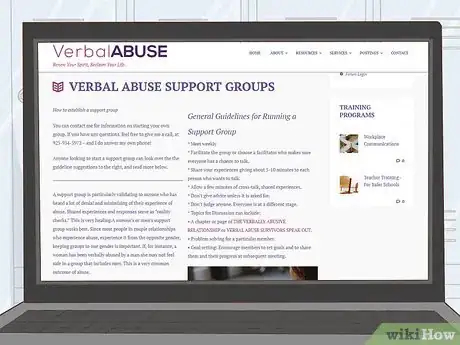This article was co-authored by Michelle Shahbazyan, MS, MA and by wikiHow staff writer, Danielle Blinka, MA, MPA. Michelle Shahbazyan is the Founder of The LA Life Coach, a concierge life, family, and career coaching service based in Los Angeles, California. She has over 10 years of experience with life coaching, consulting, motivational speaking, and matchmaking. She has a BA in Applied Psychology and an MS in Building Construction and Technology Management from Georgia Tech University, and a MA in Psychology with an emphasis on Marriage and Family Therapy from Phillips Graduate University.
There are 9 references cited in this article, which can be found at the bottom of the page.
This article has been viewed 18,257 times.
Verbal abuse is a form of emotional abuse, and it’s never okay. Dealing with verbal abuse is painful, so you probably want it to stop immediately. While you can’t control someone’s behavior, there are ways to respond that can help you get the abuse to stop. Additionally, you can try to break the abuse pattern for good. However, it’s important that you also get support for yourself as you deal with this difficult situation.
Steps
Responding in the Moment
-
1Avoid arguing with them because they won’t change their mind. When someone verbally abuses you, it’s normal to want to defend yourself because they’re being unfair. While you have every right to argue with them, it usually makes the abuse worse. Don’t try to explain why what they’re saying is wrong.[1]
- For instance, let’s say your partner calls you lazy for not washing a dirty dish. You might be tempted to argue that you’re not lazy because you’ve been working all day and cleaned the entire house the day before. However, they’re not going to admit that what they’re saying is wrong and will likely escalate instead.
-
2Identify what type of verbal abuse they’re using. Instead of telling them why they’re wrong, explain that what they’re saying is abusive. First, think about what they’re saying and why it hurts you. Then, decide what type of verbal abuse it is. Here are the common ways people verbally abuse you:[2]
- Calling you names to hurt your feelings or undermine you.
- Using hurtful labels, such as liar, cheater, or hysterical.
- Trying to convince you that your memories, thoughts, or feelings are false.
- Blaming you for things you can’t control.
- Withholding information from you on purpose.
- Refusing to share thoughts and feelings.
- Yelling at you.
- Threatening you.
Advertisement -
3Ask the person to stop being verbally abusive in a calm voice. It’s possible that the person doesn’t know they’re being abusive. Even if they do, calling them out on it can help you get them to stop. Using a calm, non-judgmental voice, firmly tell them to stop talking to you this way. Keep your request short and to the point.[3]
- You might say, “Don’t blame me for something I can’t control,” or “Stop name calling,” or “Stop trying to rewrite history.”
-
4Walk away from the situation if they continue the abuse. While calling out the behavior often helps, it might not always get them to stop. If the abuse continues, remove yourself from the situation. Create distance between you and your abuser, and reach out to a friend or loved one for support.[4]
- Say, “Let’s take a break from this conversation until we’re both feeling calm.” Then, go somewhere you feel safe.
Tip: Over time, the person may stop verbally abusing you if you consistently call them out when they do it. However, some abusers can’t stop without going to therapy and trying to change.
-
5Use self-soothing techniques to cope if you can’t leave. Unfortunately, sometimes you can’t just walk away from your abuser. When this happens, the best way to deal with the abuse is to self soothe. Instead of listening to the abuse, tell yourself that you’ll be okay soon. Notice the feelings you’re having, and give yourself permission to feel them and let them pass. Then, picture yourself getting the love and support you need.[5]
- For instance, let’s say your boss is yelling at you. While they’re shouting, think to yourself, “I don’t deserve this. Soon, this will be over and I’ll be able to talk to someone who appreciates me. I feel really frustrated and sad because it seems like I can’t do anything right, but I know that my boss’s expectations are unreasonable.”
-
6Take a break from this person if they frequently abuse you. If someone continues to abuse you, it’s best to spend time away from them. Tell the person that you aren’t okay with their behavior and need some space. Then, spend less time with them, limit your contact, and think about whether or not you want to continue your relationship.[6]
- Say, “Lately I’ve felt like I need to walk on eggshells to keep you from yelling and name calling. That’s not okay with me. I need some time to myself to figure out where I see this relationship going.”
Variation: If the person continues to abuse you, it’s best to end the relationship. This can be really difficult, especially if they’re a family member or partner. If you need to leave, rely on your support system to help you.
Changing the Pattern
-
1Reflect on your beliefs about the event that triggered the abuse. When you’re going through verbal abuse, it’s normal to question what’s happening and to wonder if your abuser is right. This can make you form beliefs about what’s happening that are harmful to you. Fortunately, looking at the events from a different perspective may help you realize your truth. This can help you start to break the pattern of abuse.[7]
- For instance, let’s say your mom calls you and says, “I can’t believe I raised such a spoiled, selfish child. You can’t even be bothered to call me.” This might make you feel really bad about yourself and possibly even guilty for not calling. However, you might remind yourself that the reason you didn’t call her is that she’s always mean to you. Furthermore, you might list the reasons why you’re not spoiled or selfish.
-
2Let yourself feel healthy negative emotions so they pass. Negative emotions are really unpleasant, so it’s understandable that you’d want to avoid them. However, giving yourself permission to be with your feelings can help you process them faster. When you’re feeling upset over the abuse, identify the emotion you’re feeling. State why you feel that way and let the emotion pass on its own.[8]
- For instance, let’s say your partner came home mad and said, “I hate having to come home to someone as worthless as you.” This is a very hurtful statement that might trigger a mixture of pain, sadness, and anger. You might say to yourself, “Right now I’m feeling really hurt and sad because someone I love is being so mean to me. I’m also angry because I know I don’t deserve this.”
Tip: Someone who makes you feel bad doesn’t deserve you in their life. Reach out to someone you trust for help in getting away from them. You’re entitled to love and support, and there are people out there who will give you that.
-
3Avoid responding to them with abuse because it continues the cycle. When someone is being mean to you, it’s normal to want to respond in kind. However, saying hurtful things back to them will only make the situation worse. Instead, model the behavior you want to see from them.[9]
- You might say, “I can see that you’re upset, and I’m sorry you feel that day. Let’s take some time to calm down.”
-
4Set boundaries with your abuser to protect yourself. Boundaries tell the other person what you will and won’t accept from them. Think about your relationship expectations and the behaviors you want to stop. Then, talk to your abuser about it. Make sure you set consequences for them crossing your boundaries.[10]
- For example, you might tell your mom, “If you start to call me names, I’m going to hang up the phone immediately.”
- You might tell your partner, “If you start to yell at me, I’m calling my sister to come pick me up.”
EXPERT TIPMichelle Shahbazyan is the Founder of The LA Life Coach, a concierge life, family, and career coaching service based in Los Angeles, California. She has over 10 years of experience with life coaching, consulting, motivational speaking, and matchmaking. She has a BA in Applied Psychology and an MS in Building Construction and Technology Management from Georgia Tech University, and a MA in Psychology with an emphasis on Marriage and Family Therapy from Phillips Graduate University.Life Coach
 Michelle Shahbazyan, MS, MA
Michelle Shahbazyan, MS, MA
Life CoachOur Expert Agrees: If someone is verbally abusing you and you feel safe talking to them, pick a time when they're calm, and respectfully let them know how they're making you feel. If you speak with them once or twice and there's no change, you're then in a position where you have to decide whether you want to continue spending your valuable time and space with that person.
-
5Talk to your abuser about how you feel. It’s possible that your abuser doesn’t realize that they’re hurting you. Chances are, they learned this behavior by watching someone else, possibly a parent. Ask them to have a sit down conversation with you in a place where you feel safe. Then, calmly explain how you feel using I-statements.[11]
- Say, “I feel really hurt when you call me names,” or “I want us to talk to each other without yelling.”
Warning: If you’re worried their verbal abuse might escalate to violence, remove yourself from the situation and get help. Never put your safety in jeopardy.
-
6Don’t blame yourself because abuse is never your fault. Your abuser might try to convince you that you did something to trigger the abuse, but this is never the case. Abuse stems from the person doing it, so it’s never your fault. Put the blame on the person who’s doing the abuse, regardless of what triggered it.[12]
- It’s okay if you’re having a hard time not blaming yourself. Talk to someone you trust or a counselor to help you deal with these feelings.
-
7Report your abuser if it’s happening at work or school. Unfortunately, verbal abuse can come from a boss, teacher, or classmate. When this happens, you might feel helpless because it’s hard to get away from them. The best way to deal with it is to tell someone who is above them, like their supervisor or a principal. Ask for help in dealing with the abusive behavior.[13]
- Say, “My teacher is calling me names like dummy and lazy. It makes me feel really bad about myself and I’m worried she isn’t grading my work fairly. Can you help?”
- When you’re at work, keep the focus on how the abuse is affecting your performance. You might say, “My boss calls me names when he’s upset about something. It’s creating a hostile work environment and making it hard for me to concentrate on work. I need help to improve our communication.”
Tip: If your boss is verbally abusive, do your best to gather evidence before you report them. For instance, you can typically record conversations legally if you’re part of them. However, check your employer handbook to make sure there are no workplace rules against this.
Getting Support
-
1Manage your stress so that you’re better able to cope. Dealing with verbal abuse is really stressful, so it’s important that you use healthy coping strategies. Pick out stress relief activities that help you, then incorporate them into your daily life. Here are some things to try:[14]
- Exercise for 30 minutes a day.
- Do yoga.
- Spend time in nature.
- Play with your pet.
- Use aromatherapy.
- Color in an adult coloring book.
- Engage in a hobby.
- Read a book.
- Take a hot bath.
-
2Talk to someone you trust about what’s happening to you. You need someone you can vent your feelings to and feel better. Choose a friend or family member who will back you up and not minimize the abuse. Then, tell them what you’re experiencing and how it makes you feel.[15]
- Let them know if you want advice or not. Say, “I really need advice on what to do,” or “I’m not looking for advice. I just want to vent my feelings.”
-
3Attend a support group to help you cope. A support group can help because it lets you connect with others who’ve been in the same situation. Look for a support group in your area by asking your therapist or searching online. Then, attend the meetings and share your experience.[16]
- You may be able to get valuable advice from people who’ve survived verbal abuse.
-
4See a therapist to work through your feelings. Sometimes your feelings are too much to deal with on your own, and that’s okay. A therapist can help you identify problematic thoughts and behaviors that stem from your abuse so you can feel better. Additionally, they’ll help you learn better ways to cope with what’s happening. Ask your doctor to refer you to a therapist or search for one online.[17]
- Your therapy appointments may be covered by insurance, so check your benefits.
-
5Call a helpline for support if someone in your household is abusing you. Verbal abuse is also a form of domestic abuse. If someone in your home is abusing you, calling a hotline can help you find support. Get the phone number for a hotline in your area and use it when you need it. Here are some numbers you can try:
Warnings
- Don’t dismiss the behavior because it’s “just” verbal abuse. All forms of abuse are unacceptable.⧼thumbs_response⧽
References
- ↑ https://www.psychologytoday.com/us/blog/the-mysteries-love/201612/the-most-effective-way-put-end-verbal-abuse
- ↑ https://www.helpguide.org/articles/abuse/child-abuse-and-neglect.htm
- ↑ https://www.psychologytoday.com/us/blog/the-mysteries-love/201612/the-most-effective-way-put-end-verbal-abuse
- ↑ https://www.psychologytoday.com/us/blog/the-mysteries-love/201612/the-most-effective-way-put-end-verbal-abuse
- ↑ https://www.nami.org/Blogs/NAMI-Blog/February-2018/The-Problem-with-Yelling
- ↑ https://www.psychologytoday.com/us/blog/the-mysteries-love/201612/the-most-effective-way-put-end-verbal-abuse
- ↑ https://www.healthyplace.com/abuse/verbal-abuse/5-ways-of-dealing-with-verbally-abusive-relationships
- ↑ https://www.healthyplace.com/abuse/verbal-abuse/5-ways-of-dealing-with-verbally-abusive-relationships
- ↑ https://blogs.psychcentral.com/roar/2016/03/4-ways-to-stop-the-language-of-abuse/
- ↑ https://www.healthyplace.com/abuse/verbal-abuse/5-ways-of-dealing-with-verbally-abusive-relationships
- ↑ https://www.healthyplace.com/abuse/verbal-abuse/5-ways-of-dealing-with-verbally-abusive-relationships
- ↑ https://www.helpguide.org/articles/abuse/child-abuse-and-neglect.htm
- ↑ https://www.psychologytoday.com/us/blog/the-mysteries-love/201612/the-most-effective-way-put-end-verbal-abuse
- ↑ https://www.helpguide.org/articles/stress/stress-management.htm
- ↑ https://www.healthyplace.com/abuse/verbal-abuse/5-ways-of-dealing-with-verbally-abusive-relationships
- ↑ https://www.helpguide.org/articles/abuse/child-abuse-and-neglect.htm
- ↑ https://www.nami.org/Blogs/NAMI-Blog/February-2018/The-Problem-with-Yelling
- ↑ https://www.thehotline.org/
- ↑ https://www.dawncanada.net/issues/crisis-hotlines/
- ↑ https://www.lwa.org.uk/get-help-now.htm












































































